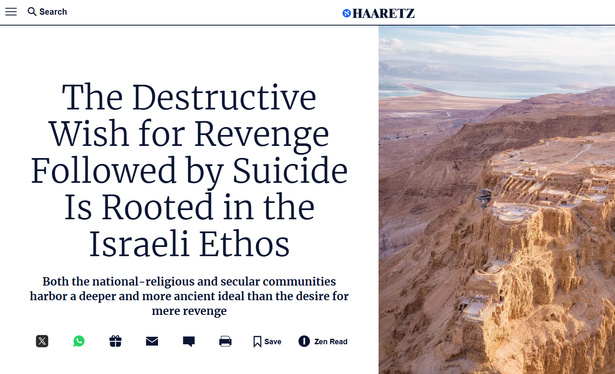Quoting Historian Shai Hazkani and Tamir Sorek on how religious rights’ vision for Jewish supremacy and Palestinian elimination has gained mainstream acceptance in Israeli society:
Hazakani and Sorek analyzed Rabbi Yitzchak Ginzburg's sermon "Time to Crack the Nut," which outlined a plan to dismantle what he termed the four "shells" protecting Israeli democracy: media, legal system, government institutions, and the military's ethical constraints. Ginzburg, a #Chabad-trained rabbi who became influential among religious Zionist settlers, particularly the "hilltop youth" militia, advocated for the complete removal of Palestinians from historic Palestine.
Key survey findings from March 2025:
- 82% of Israeli Jews support forcibly expelling Gaza residents (up from 45% in 2003)
- 56% support forcibly expelling Palestinian citizens of Israel (up from 31% in 2003)
- 47% believe the Israeli military should kill all residents when conquering enemy cities, following the biblical precedent of Jericho
- 65% believe a contemporary Amalek exists, with 93% of those saying the biblical commandment to "blot out Amalek" applies today
There’s a particularly high support among younger Israelis, with 66% of those under 40 supporting expulsion of Palestinian citizens and 58% endorsing total elimination of enemy populations.
[…] Ginzburg's achievement is indeed the result of shattering the shells, even if the "crackers" weren't always his direct supporters. Hebrew media, the first shell, was always enlisted but maintained a veneer of professionalism. Recently, for the most part, it has abandoned even this pretense, and since the massacre in the Gaza envelope, many journalists have abandoned critical coverage, with some even joining the bellicose calls for revenge, expulsion, and extermination.
[…] The judiciary, which refused to openly declare Jewish supremacy in the Land of Israel and their right to expel, exterminate, or starve their enemies — while simultaneously playing a crucial role in preserving the occupation — was seen by Ginzburg as a stumbling block that "we must break... through mockery and 'contempt of court.'" It appears that the second shell has also undergone change, if it hasn't been completely removed already: about two months ago, Supreme Court Justice David Mintz rejected a petition by the organization "Gisha" to compel Israel to ensure humanitarian aid delivery to the Strip, ruling that this constitutes a "biblical commanded war," effectively authorizing the denial of food, water, and medicine to millions of Gazans. Mintz's ruling, a resident of the settlement Dolev, joined by Chief Justice Yitzhak Amit and Justice Noam Sohlberg from the settlement Alon Shvut, is already claiming lives.
[…] The education system, part of that same second shell, became a workplace where Jewish teachers promoting universal values risk dismissal (for Arab teachers, this danger was never foreign). Education researchers point to a sharp shift toward ethnocentric nationalism in curricula since the Second Intifada, and this process has led to high support for expulsion and extermination, particularly among those who completed their studies in the past 20 years. 66% of those 40 and under support expelling Arab citizens of Israel, and 58% want to see the IDF replicate Joshua's actions at Jericho. Generational gaps in political attitudes aren't unusual, but in Israel it has widened dramatically since the beginning of the 21st century.
[…] It seems there's little need to elaborate on the Knesset and government. Ginzburg himself demands that "the government — whether left or right — we must eliminate. We must bring it down, and when a new one arises, bring that down too, and so on — until establishing Torah rule in the land." The five election cycles held within three and a half years show that here too, Ginzburg can boast of considerable divine assistance.
The two scholars argue that October 7th provided the opportunity Ginzburg had long awaited to implement his vision. They trace how his ideology has penetrated Israeli institutions - from media abandoning critical coverage to Supreme Court Justice David Mintz recently ruling that denying humanitarian aid to Gaza constitutes a "biblical commanded war."
They conclude that without rejecting Jewish supremacy entirely and establishing genuine equality between the Jordan River and Mediterranean Sea, Israel will continue its trajectory toward what they describe as a "Spartan and ostracized society."
Hebrew https://www.haaretz.co.il/magazine/2025-05-22/ty-article-magazine/.highlight/00000196-f3a3-d6d3-ab9e-f3bbf6070000 or https://archive.is/yI4Dy
Shai Hazkani, a Professor of History and Jewish Studies at the University of Maryland, and Tamir Sorek, a Professor in the History Department at Penn State University, are both academic historians specializing in Israeli/Palestinian history. They have written extensively on the subject. Hazkani’s book, “Dear Palestine: A Social History of the 1948 War” (2024), and Sorek’s book, “The Optimist: A Social Biography of Tawfiq Zayyad ” (2023), are notable works in this field.
@histodons #histodons
@palestine
@israel
#GazaGenocide
#SettlerViolence #hilltopyouth #zionism
#OatmealQuotes #jewishsupremacy
* Edit: publications actuall titles in English
